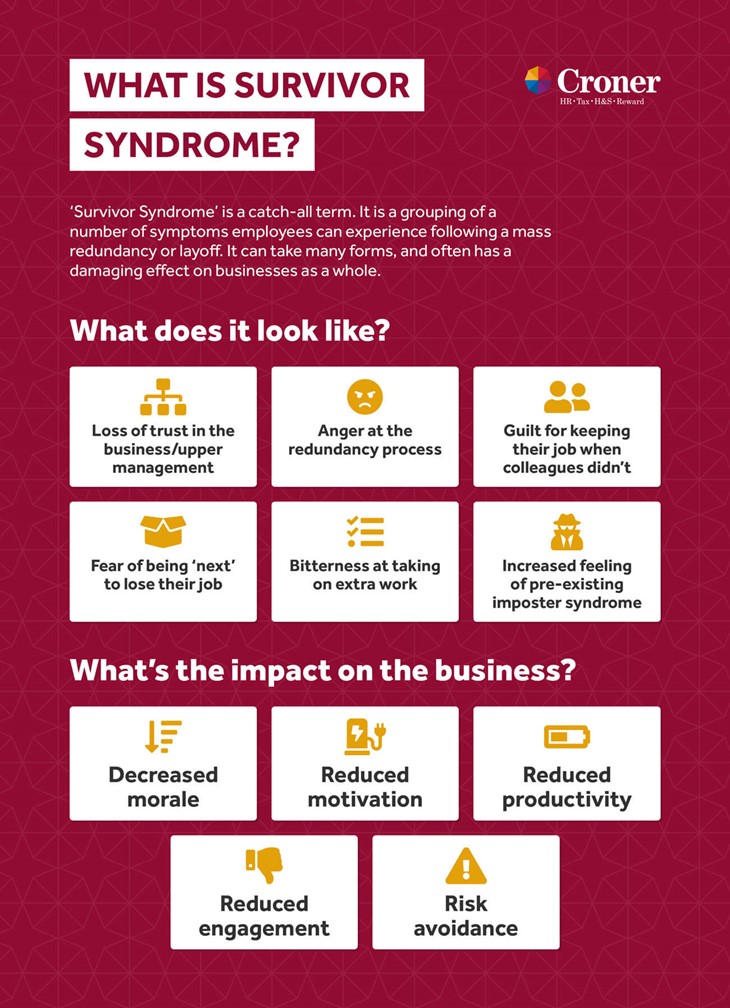Add this infographic to your website by copying and pasting the following embed code:

What is Survivor Syndrome?
‘Survivor Syndrome’ is a catch-all term. It is a grouping of a number of symptoms employees can experience following a mass redundancy or layoff. It can take may forms, and often has a damaging effect on businesses as a whole.
What does it look like?
- Loss of trust in the business/upper management
- Anger at the redundancy process
- Guilt for keeping their job when colleagues didn’t
- Fear of being ‘next’ to lose their job
- Bitterness at taking on extra work
- Increased feeling of pre-existing imposter syndrome
What’s the impact on the business?
- Decreased morale
- Reduced motivation
- Reduced productivity
- Reduced engagement
- Risk avoidance
How do I combat it?
The following five tips are for dealing with survivor syndrome after you’ve made redundancies. But there is one way to reduce the symptoms before they even start: Ensure that your redundancy process is fair and open. This helps combat the syndrome and it will reduce the chance of unfair dismissal claims.
1. Direct and open communication
Discuss survivor syndrome with your employees. If you can be open and honest you’re less likely to come across as an unfeeling overlord. Instead, staff will see you as a genuine employer who had to make difficult choices. This will enhance your credibility and encourage others within the company to be more open.
Consistency is also key. Don’t send mixed messages—or even worse—different messages to different people. This could result in claims of favourable treatment, nepotism, and may even result in unfair dismissal claims.
2. Halt needless spending
Be sensible with your spending after a mass redundancy. This isn’t the time for office refurbishments or a brand-new company car. Any unnecessary spending will only add to the feeling of resentment your employees may be feeling.
3. Stay in contact with former employees
Just because they’re no longer with the business doesn’t mean you have to cut all ties. In fact, maintaining a good relationship with former employees is advantageous in a number of ways. It will boost trust with existing employees. It will make former employees feel like there is a place for them at the company, even if a role isn’t available right now. You could even go as far as updating former staff with the latest job roles you’re recruiting for in an effort to get them back.
Even if they never work for you again, you’ll have positive ambassadors for the company.
4. Establish clear vision moving forward
For those feeling like they might be ‘next’, a clear plan is key. If an employee knows that there is work ready for them, they’ll feel like a valued member of the team. This will help address their anxiety.
It’s important to provide regular updates during this time too. Staff apprehension might be fleeting, or it might come back in waves. Reassure them of their position. Make sure they understand their role and expected performance standards. And, remind them of any opportunities for future advancement, including training and promotions.
If you can, provide reassurance that no further redundancies will be required. DO NOT give that reassurance if you can’t guarantee it.
5. Offer further support if possible
The redundancy process may have left those experiencing survivor syndrome stressed, anxious, or physically ill. For those who are struggling more than others, direct them to the support available.
If you have access to an Employee Assistance Programme (EAP), remind them of the details. In the spirit of open communication, you could even send a mass email encouraging anyone struggling to use the EAP. This will highlight the support they have available without drawing attention individual cases.
If you suspect employees are suffering from imposter syndrome, read this article for further information.
Expert support
Redundancies are always difficult. But they’ve never been more stressful than right now. If you need support with HR, health & safety, or redundancy specifically, contact Croner on 01455 858 132.
Related resources
Categories
- Business Advice
- Contracts & Documentation
- Culture & Performance
- Disciplinary & Grievances
- Dismissals & Conduct
- Employee Conduct
- Employment Law
- End of Contract
- Equality & Discrimination
- Health & Safety
- Hiring & Managing
- Leave & Absence
- Managing Health & Safety
- Moving
- Occupational Health
- Pay & Benefits
- Recruitment
- Risk & Welfare




